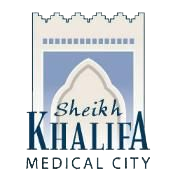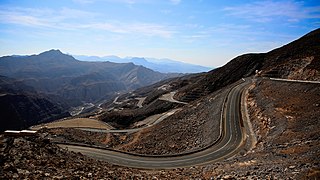
The Emirate of Fujairah is one of the seven emirates that make up the United Arab Emirates, the only one of the seven with a coastline solely on the Gulf of Oman and none on the Persian Gulf. Its capital is Fujairah.

Sheikh Rashid bin Saeed Al Maktoum was an Emirati royal, politician and a founder of the United Arab Emirates. Al Maktoum was the first vice president and second prime minister of the United Arab Emirates, and was the ruler of Dubai. He ruled Dubai for 32 years from 1958 until his death in 1990. He was the vice president from the founding of the UAE until his death. Al Maktoum was the first vice president to serve as prime minister concurrently, when he became prime minister on 30 April 1979. Every prime minister after him was de facto also vice president.

E 11 is a highway in the United Arab Emirates (UAE). The longest road in the Emirates, it stretches from the Al Batha border crossing at the Saudi Arabia–UAE border in al-Silah in the al-Dhafra region of the Emirate of Abu Dhabi and ends at the Oman–UAE border crossing of al-Darah in al-Jeer, Emirate of Ras al-Khaimah, running roughly parallel to UAE's coastline along the Persian Gulf. The road forms the main artery in some emirates' main cities, where it assumes various alternate names —Sheikh Maktoum Bin Rashid Road and Sheikh Khalifa bin Zayed Road in Abu Dhabi, Sheikh Zayed Road in Dubai, Al Ittihad Road in Sharjah Emirate and Ajman Emirate, and Sheikh Muhammad bin Salem Road in Ras al-Khaimah.
NMC Health is a healthcare chain and distribution business in the United Arab Emirates (UAE). The company is headquartered in Abu Dhabi and has branch offices in Dubai, Ajman, Al Ain and Northern Emirates. The company operates and manages over 200 facilities in 19 countries.
Rashid Hospital is a 786-bed general medical/surgical hospital in Dubai, the United Arab Emirates, and is a part of the Dubai Health Authority. Built in 1973, it is the city's second oldest hospital, and is located on the Oud Metha Road adjacent to Dubai Creek.

Al Noor Hospitals Group plc was a business operating medical-surgical facilities located in Abu Dhabi City, United Arab Emirates. The company transformed healthcare in Abu Dhabi under the leadership of Dr Kassem Alom and Sheikh Mohammed Bin Butti and for many years the company was the largest healthcare operator in Abu Dhabi: it had a market share of 39% at the time of its initial public offering. It also provided support for several major humanitarian operations in the region including relief for the victims of Bam earthquake in southern Iran in 2003 and setting up the Emirates International Humanitarian Mobile Hospital in the remote town of Juba in southern Sudan in 2009.

Sheikh Khalifa Medical City (SKMC), serves as the flagship institution for Abu Dhabi Health Services Company (SEHA).

Bavaguthu Raghuram Shetty, commonly known as B.R. Shetty, is an Indian-born businessman and former-billionaire, the founder and acquirer of a number of companies based in the United Arab Emirates, including Abu Dhabi–based NMC Health, Neopharma, BRS Ventures, and Finablr.

Cardiovascular disease is the principal cause of death in the UAE, constituting 28 percent of total deaths; other major causes are accidents and injuries, malignancies, and congenital anomalies.

Kenneth Ouriel is a vascular surgeon and medical researcher. In 2007, Ouriel was appointed the chief executive officer of Sheikh Khalifa Medical City in Abu Dhabi. In 2009, he was senior vice president and chief of international operations at NewYork-Presbyterian Hospital. He has been described as one of America's top vascular surgeons.

The Dubai Health Authority is a government organization overseeing the health system of Dubai, United Arab Emirates.
Kanad Hospital is a hospital in Al Ain, United Arab Emirates, that was established in 1960 by the American missionary couple Drs. Pat and Marian Kennedy. It is the oldest hospital in Al Ain and the second oldest in the United Arab Emirates. It is currently a 200 bedded facility.

Dubai Healthcare City (DHCC) is a healthcare free economic zone situated in the Emirate of Dubai, United Arab Emirates. DHCC was launched in 2002 by Mohammed bin Rashid Al Maktoum, vice-president and Prime Minister of the UAE and Ruler of Dubai. DHCC was mandated by the government to meet the demand for high-quality, patient-centered healthcare, and the main aim is to attract tourists to Dubai for medical services and treatments.
The Iranian Hospital in Dubai is located on the Al Wasl Road in Jumeirah. Inaugurated on 14 April 1972, it was built by and is affiliated to the Iranian Red Crescent Society, and is the oldest known provider of healthcare services in Dubai. Most of the hospital's medical staff are from the Iranian community in the UAE. It is a private hospital and comes under Dubai Health Authority (DHA).

The Abu DhabiDepartment of Health is an Abu Dhabi government regulative agency for the healthcare sector in the Emirate of Abu Dhabi. It shapes the regulatory framework for the health system, inspects against regulations and enforces standards in the emirate.
VPS Healthcare is a multinational healthcare group headquartered at Abu Dhabi, United Arab Emirates. The group was founded in 2007 by Indian-born businessman Shamsheer Vayalil. The healthcare group now runs 23 hospitals and about 125 medical centres spread across the Middle East, Europe, and India.
The COVID-19 pandemic in the United Arab Emirates is part of the worldwide pandemic of coronavirus disease 2019 caused by severe acute respiratory syndrome coronavirus 2. The first confirmed case in the United Arab Emirates was announced on 29 January 2020. It was the first country in the Middle East to report a confirmed case.

Tourism in the United Arab Emirates is an important part of the Emirati economy, and consists of domestic and international components. In 2018, tourist industry composed over 2 dirham to country's GDP.












